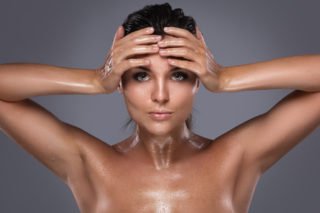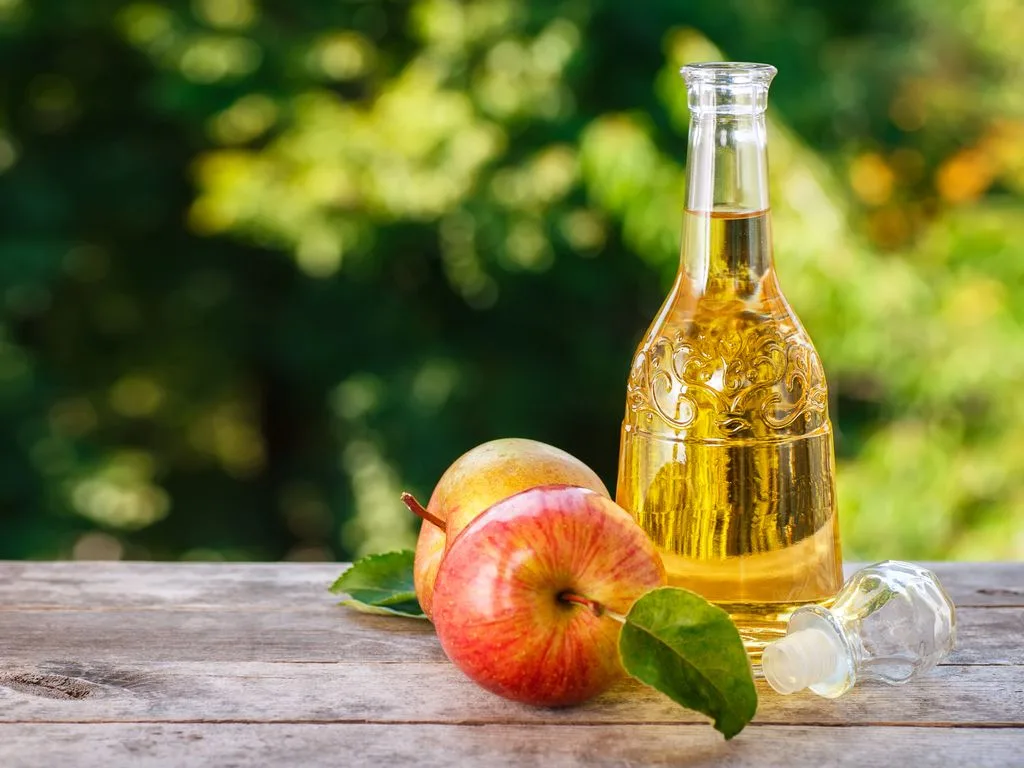When it comes to skincare, a lot of us are looking towards more natural ingredients. There is hope that these ingredients will help to maintain the health of our skin, all whilst providing additional benefits. It makes sense that a lot of us are reaching into our kitchen cabinets to address our skincare concerns. That said, every kitchen needs a bottle of apple cider vinegar (ACV), and it turns out that your beauty cabinet does too.
Apple Cider for Beauty. Really?
Apple cider vinegar has grown in popularity over the years, gaining a reputation for providing a number of health benefits, ranging from weight loss to reducing the risk of diabetes. However, how does their effectiveness compare in terms of skincare? Well, according to research published in Biomolecules & Therapeutics, apple cider vinegar contains anti-fungal, antibacterial, and antioxidant properties – all of which will help to address skincare concerns.
Apple cider skincare benefits
Addresses acne
Apple cider vinegar is created through the formation of apple cider with yeast, and other bacteria. This process results in the creation of acetic acid – a compound that contains antibacterial and anti-fungal properties, which will help to prevent the formation of acne (1). As acne and breakouts occur as a result of bacteria and oil building up and clogging the pores, using ACV to reduce the number of bacteria on the skin can help to prevent this.
Additionally, ACV also contains alpha hydroxy acid, which is a well-known skin ingredient that has been found to also remove bacteria from the skin, and unclog pores.
 Exfoliates skin
Exfoliates skin
The skin regenerates itself every 27 days, doing away with old and dead skin cells, in order to make way with new skin cells. Unfortunately, as we age, the rate at which the skin renews itself begins to slow down. That said, it’s important to exfoliate as the process helps to speed up cell turnover. This then leaves one with a younger and brighter skin complexion.
As mentioned, apple cider vinegar contains alpha hydroxyl acid. Through the process of chemical exfoliation – which relies on chemicals to remove dead skin cells – it can then help to leave one with healthier skin.
Additionally, apple cider vinegar also contains malic acid, which studies have found is also effective as a chemical exfoliator.
Anti-aging
Apple cider vinegar contains beta-carotene, quercetin, and catechin – compounds that have been shown to contain anti-aging properties.
Beta-carotene, found in carrots and other colorful fruits and vegetables, has been linked to preventing premature aging. It does this by encouraging the production of collagen. In doing so, it then helps to leave the skin firm and supple, reducing the appearance of wrinkles.
Quercetin, found in red onions and kale, also boasts anti-aging properties. A study published in Plant Foods For Human Nutrition found that quercetin not only encourages the production of collagen but can also protect the skin from the aging effects of free radicals, which are environmental pollutants.
Lastly, catechin, which can also be found in green tea, can help to maintain moisture. In doing so, it helps to prevent the formation of wrinkles.
Hair health 
The overgrowth of yeast and bacteria on your scalp can lead to the formation of dandruff, which can then jeopardize your hair health.
However, as mentioned, apple cider vinegar contains antimicrobial properties, and with an ACV hair wash, it can help to eliminate any lingering bacteria on the scalp, leaving you with a healthier set of locks.
Foot health
If you’re battling with foot odor, as a result of excess sweating, ending your evening with an ACV foot soak is exactly what you need.
Foot odor is often the result of bacteria, yet the antibacterial and anti-fungal properties found in apple cider vinegar will help to kill the bacteria and eliminate any unpleasant odors.
Does apple cider vinegar have any side effects?
As wonderful as the aforementioned skin benefits are, it’s important to remember that at the end of the day, apple cider vinegar’s potency can be quite harsh on the skin, especially if you have dry or sensitive skin.
That said, if you really want to use ACV in your skincare routine, it’s important to always dilute it with water, preferably a tablespoon of apple cider vinegar per cup of water. Additionally, it’s best to use the solution sparingly, preferably once or twice a week.
If you want to use it on your skin, apply the solution to your skin using a cotton ball, leave it on for a few minutes, and then rinse it off with cool water.
As a hair wash, you can lather the solution into your hair, let it sit for a couple of minutes, and then rinse it out.
References
Kapuscinska, Alicja & Nowak, Izabela. (2015). Use of organic acids in acne and skin discolorations therapy. Postępy Higieny i Medycyny Doświadczalnej. 69. 374-383. 10.5604/17322693.1145825.
Stipčević, Tamara & Piljac Zegarac, Jasenka & vanden berghe, Dirk. (2006). Effect of Different Flavonoids on Collagen Synthesis in Human Fibroblasts. Plant foods for human nutrition (Dordrecht, Netherlands). 61. 29-34. 10.1007/s11130-006-0006-8.
Suh, D. C., Kim, Y., Kim, H., Ro, J., Cho, S. W., Yun, G., … Lee, J. (2014). Enhanced In Vitro Skin Deposition Properties of Retinyl Palmitate through Its Stabilization by Pectin. Biomolecules & therapeutics, 22(1), 73–77. doi:10.4062/biomolther.2013.094




![women [longevity live]](https://longevitylive.com/wp-content/uploads/2020/01/photo-of-women-walking-down-the-street-1116984-100x100.jpg)










